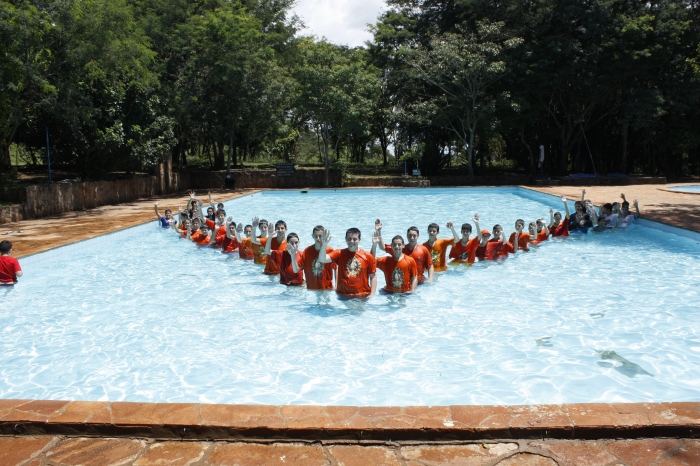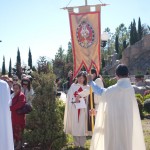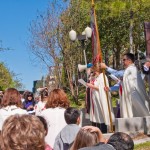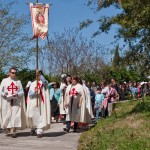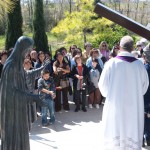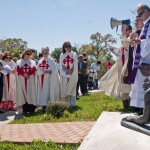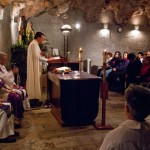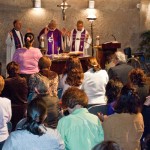Man is both body and soul. The angels shine contemplating God and singing His praises in pure spirit, but man with his body as well. His actions, every beat of his heart should give glory to God.
Man in Paradise had a perfect nature. All he did was orderly and pleasant to God. But with original sin, the situation changed …with labor and toil shall you eat thereof all the days of your life… (Genesis 3:17)
No longer are all things in man subject to God’s will. Man is burdened by disorderly passions. He must fight against inclinations towards evil, as he was cursed to a fallen nature.
“For you are dust, And to dust you shall return. …”
Oh how we are subject to that just sentence! At every instant our flesh calls us despise the law written in the bronze of our souls! Even worst, not only the flesh, but the Devil and the World conspire against our salvation, against our union with God! How can we maintain our minds in Heaven when our feet are dragging?
Of course, for man that is impossible. Only with God’s grace can man stably practice the 10 commandments. St. Thomas teaches us that while a man is capable of doing some ethical or moral good, supernatural good is only with His Grace.
But graces come in many forms. To simplify, we’ll use an example used a lot demonstrate the difference between sufficient grace (gratia mere sufficiens) and efficacious grace (gratia efficax).
Sufficient graces are those that give the person the possibility to do good.
A man who wants to cross a river needs a boat, oars and the strength to do so.
It is analogous to a man who wants to practice good. He needs grace. God gives it.
But when the current is stronger than normal? When the task at hand is so much more difficult than the common situation? More help is needed.
There God not only gives you oars, but He shall push the boat towards the goal.
Of course, man always has free will, but isn’t it hard to row against a hurricane of graces?
When God sends His winds, at most you need to open the sails to reach the goal. Sometimes not even that. How many wonderful stories about mystics could we tell? They saw the most sublime things, as if ascended into Heaven. But not only they, but every person, at one point in their lives, was subject such a grace, in a greater or lesser degree.
But the journeys of a Catholic are not always full of winds that push towards the Heavens. How many times have we found ourselves in a dark night, and the boat slipping from our control?
Does God abandon us? No, absolutely not! Does the mother abandon the child when she puts the child down from her arms and gives it her hand as it may walk on its own feet? No, God helps us in the same way, as we may be strengthened. He shall always be there. Even St. Paul begged God to take Him in His arms as the mother takes child the child and carries it where she wishes and protect it. But the Lord told him, as we read in 2 Corinthians 12: My grace is sufficient for you: for power is made perfect in infirmity.
This is where discipline comes in. Our small contribution to the action of grace. A man must put order into his life in so that he may triumph over his worst enemy: himself. To defeat all his evil inclinations he needs both grace and a bit of effort (Or sometimes a lot!) . “Pray as though everything depended on God. Work as though everything depended on you.” – St. Augustine.
He needs to make efforts to strengthen his will. Waking up early and having schedules to follow make a Herald use his time wisely and efficiently. Practicing ceremonials, be it for mass or the muster of the Credo before classes or even the cortege from dinner to Complines, helps the body discipline its movements to make them dignified movements yet leaving the mind open to reach the highest contemplations that grace proportions when we are properly disposed for them. If angels had bodies… imagine it…we want to imitate them!
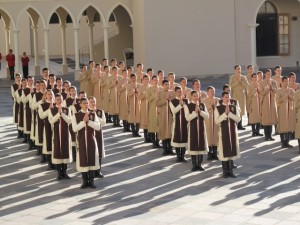
-
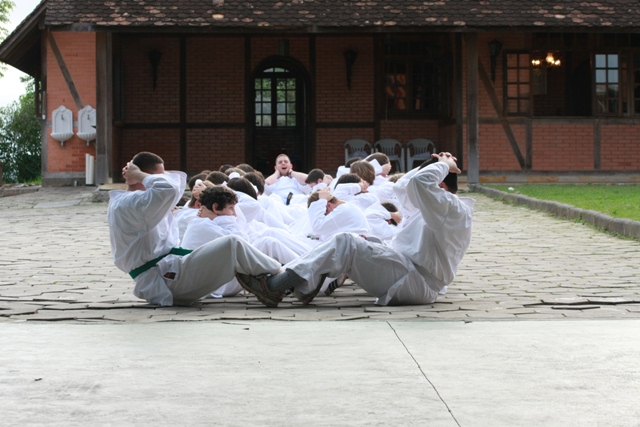
Discipline is not only work! Everything helps a young herald be always with enthusiasm to love, know and serve Our Blessed Mother and Her Divine Son!
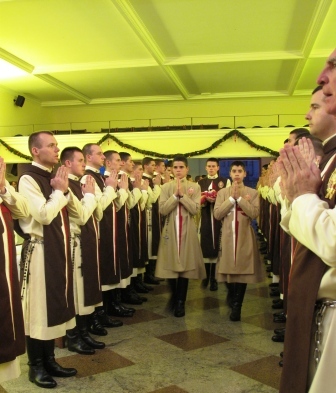
Washing dishes, cleaning, exercise, silence, early wake-up, lights out, drills, music practice, Marian missions (will be the subject of future posts), parish duties, community admonishments, chapters of faults, studies, strong reading habits and being expected to always do everything with a love for perfection creates habits that end up forming ideas, that then forms mentalities and finally forms saints. All this next to an intense spiritual life make a seminarian ready for anything and willing to go and do anything that Holy Church needs of him. At a young age, obedience already becomes way of life, making him capable of things others aren’t. Living in community, having to follow an Ordo of Customs (again, we hope to write on it later) and constantly having to dominate their will and put it the hands of another make a seminarian be ready for those times that God hands us “just an oar” to give us merits. These habits end up being connatural to the person, allowing him to fly when life weights down. Without discipline, when aridness begins to ail a soul, it succumbs and is incapable of elevating the minds to God. When God sends His winds to push us towards great things and great horizons to “Put out into deep water” (Luke 5:4 ) it is easy to elevate your mind towards Him. But when He wants us to suffer the apparent abandonment as He Himself suffered to make us grow, we need to be ready for it. An athlete who wants to win a race can’t rely on having a “good day” . He has to train for it. The path towards sanctity is not always full of bright skies and and soothing winds. Sometimes it goes through dark knights and heavy storms. With discipline, overcoming those trials, always with God’s grace, becomes possible, being able to always keep the celestial objective in sight and on the path towards it.
Let us all discipline ourselves, above all in our prayer life, so we can one day with great joy say: I have fought a good fight: I have finished my course: I have kept the faith!
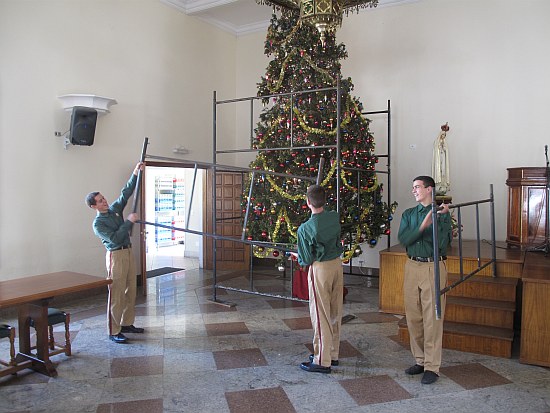
Working

Making pizza on Sundays!
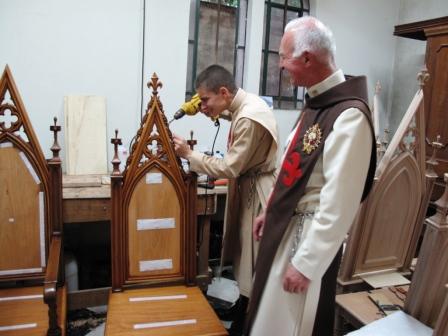
Working with wood with our Master Carpenter!

Always seeking Our Lord in the Blessed Sacrament, be it with the greatest consolations or the most challenging aridity




